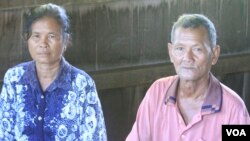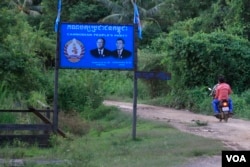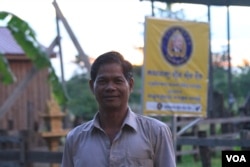Hem Savy and Men Saron are old friends, longtime neighbors, and even in-laws, after Savy’s nephew married Saron’s daughter 10 years ago.
They are also political rivals. Ms. Savy is the commune chief from the ruling Cambodian People’s Party (CPP), while Mr. Saron was chosen in June’s commune elections as a deputy commune chief from the main opposition party, the Cambodia National Rescue Party (CNRP). Even before that, they had been on different sides of the political fence for two decades.
But this was not a problem until recently. As in many rural areas of Cambodia, national-level politics are often trumped by local issues in Orey, a cluster of three muddy rice-farming villages on the banks of the Mekong River, 380 kilometers north of Phnom Penh.
Ms. Savy and Mr. Saron said they had been working side by side to build their community for years, and were eager to continue cooperating as fellow commune officials, despite being on different sides of the political fence. Instead, they have watched with dismay as inter-party relations have deteriorated over the past several months.
Since local elections in June handed control of around 30 percent of communes to the CNRP, Prime Minister Hun Sen has launched an extensive crackdown on opposition voices that has seen CNRP leader Kem Sokha jailed on treason charges. Earlier this month, the government sued the party itself for allegedly colluding in treason, a move that would allow it to be dissolved completely.
Although most coverage of the political crisis has focused on battles at the national level, local communities are also facing repercussions from the drive to dissolve the CNRP. Orey is a case in point.
“During the election, we contest in the boxing ring. But when the election is finished, we don’t think about different parties. We serve the people and focus on development despite party differences,” said Ms. Savy, 66, as she sat across from Mr. Saron, 76, at a wooden pagoda house along the river during a voter registration drive earlier this month.
Smiling at each other as they spoke, the two said they had worked together for more than 15 years in an effort to solve the biggest issues affecting the people of Orey commune, such as issuing government documents more efficiently and improving the terrible state of the commune’s main road, which is muddy and deeply rutted.
“There has been no feeling of different political parties. We are normal citizens. We are neighbors and siblings,” said Ms. Savy.
Her statement was echoed by Mr. Saron. “There is no opposition with each other. We work intimately,” he said.
However, it seems unlikely they will be able to continue working together for much longer. If the opposition party is dissolved, 5,007 opposition commune councilors will have their seats redistributed. Many commune positions were contested only by the two major parties in the June elections, leaving just the CPP to absorb all the CNRP’s seats.
In Stung Treng province, the CNRP won control of only one commune, with the other 33 going to the CPP, but a total of 29 CNRP commune councilors were elected. In Orey commune, three seats were won by the CPP, one by the CNRP, and a fifth by the royalist Funcinpec Party, led by Prince Norodom Ranariddh.
Funcinpec was a major political player in the 1990s, but has fallen sharply from its heyday, winning no parliamentary seats in the 2013 national elections and just 28 commune council seats in June’s commune elections. But it stands to win big if the CNRP is dissolved. Prince Ranariddh recently said his party would cooperate with the CPP and take over the CNRP’s 41 seats in the National Assembly.
Long Sophat, 50, the second deputy Orey commune chief, is a member of Funcinpec. But in the local context, he said he felt deeply ambivalent about his party’s recent moves to fall in line with Mr. Hun Sen’s crackdown. He worried that the dissolution of the opposition would affect Cambodia’s democracy.
“If I were treated like that, I would not be satisfied,” said Mr. Sophat about the move to take over the CNRP’s parliamentary seats.
He said that in Orey, the CPP and CNRP councilors worked well with each other and with him, and that he did not want to see Mr. Saron lose his job.
“I also pity him and feel regret since he stood and won the first deputy commune chief position,” he said of his CNRP colleague.
“There is an intimate relationship, joining hands and working normally,” he added.
The U.S. State Department last week said it was “deeply concerned” by the National Assembly’s approval of legal amendments that would allow the CNRP to be dissolved. It said the dissolution would “effectively disenfranchise the millions of people who voted for the CNRP in the 2013 and 2017 elections.”
These millions include Thet Sivorn, 25, a villager in Orey who farms rice and cassava. She said she had voted for Mr. Saron and wanted him to continue his work.
“To me, it seems he loves the people very much. If he is removed, I would feel resentful. If there is an election, I would still vote for him,” she said. “I want him to stay the same.”
Phay Khin, 45, another villager in the commune who also voted for Mr. Saron, said she agreed.
“He works well,” she said. “It also affects [people’s feelings] if he is removed.”
Even Ms. Savy, the CPP commune chief, who perhaps has the most to gain from the opposition’s dissolution, did not seem enthusiastic about the prospect, although she did not directly criticize her party’s leadership.
“I don’t like listening to any conflicts,” she said. “I like positive stories.”
Ms. Savy said she had supported the CPP since the ouster of the Khmer Rouge in 1979 because the party’s leaders helped liberate the country.
Mr. Saron, on the other hand, has supported CNRP co-founder Sam Rainsy since 1994, saying that he was attracted to opposition politics because he wished to see genuine democracy take root in Cambodia.
Prime Minister Hun Sen on Sunday called for opposition commune officials to defect to the CPP if they did not want to lose their jobs and salaries. He said they would be accepted into the ruling party in a new form of his famous “win-win policy,” which allowed Khmer Rouge officials to switch allegiance.
But Mr. Saron said he would retire from politics and relinquish his $160 monthly salary rather than join the CPP. He said the accusations of treason against the opposition and its leadership were spurious. Still, despite his effort to take a stand, he said he felt powerless and at the mercy of politicians in Phnom Penh.
“We are at the subnational level,” he said. “We cannot do anything besides listen.”









